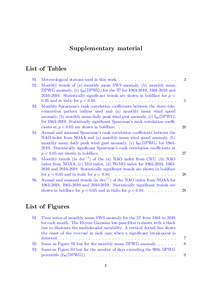Por favor, use este identificador para citar o enlazar este ítem:
http://hdl.handle.net/20.500.11765/13701
Wind stilling ceased in the Iberian Peninsula since the 2000s
| Título : | Wind stilling ceased in the Iberian Peninsula since the 2000s |
| Autor : | Utrabo-Carazo, Eduardo; Azorín Molina, César; Serrano, Encarna; Aguilar, Enric; Brunet, Manola; Guijarro Pastor, José Antonio


|
| Palabras clave : | Surface wind speed; Wind gusts; Iberian Peninsula; Stilling; Atmospheric circulation; Reversa |
| Fecha de publicación : | 2022 |
| Editor: | Elsevier |
| Citación : | Atmospheric Research. 2022 (272), 106153 |
| Versión del editor: | https://doi.org/10.1016/j.atmosres.2022.106153 |
| Resumen : | This study analyses quality controlled and homogenized near-surface wind speed series (SWS) at 87 meteoro- logical stations distributed across Spain and Portugal for 1961–2019. Multidecadal variability analysis of both mean and gusts SWS confirms for the first time in the region the cessation of the stilling (decline of SWS) and a possible weak reversal phenomenon (increase in SWS) in the last decades, varying its onset from 1999 to 2018, depending on the season and variable. Different atmospheric circulation drivers are evaluated to explain the stilling and reversal phenomena. Among the chosen teleconnection indices, the Western Mediterranean Oscillation index (WeMOi) is the one that presents the highest (positive) correlation with SWS, although the correlation (negative) with the North Atlantic Oscillation index and the Mediterranean Oscillation index in winter is also statistically significant (p < 0.05). Results show that the interannual variability of the WeMOi could exert a strong influence on both the stilling and reversal phenomena, as it displays statistically significant negative trends for 1961–2010 and positive ones (non-significant) for 2010–2019, in agreement with the observed SWS trends. The use of the Jenkinson and Collison weather type classification reveals the marked influence of certain weather types in modulating SWS changes (i.e., west, northwest, and anticyclonic types). |
| Patrocinador: | E.U.-C. was supported by the FPI fellowship (PRE2019-090148), and C.A.-M. by the Ramon y Cajal fellowship (RYC-2017-22830). This study was conducted in the framework of the IBER-STILLING project RTI2018- 095749-A-100 (MCIU/AEI/FEDER,UE), the VENTS project AICO/2021/ 023 (GVA) and the CSIC Interdisciplinary Thematic Platform (PTI) Clima. (PTI-CLIMA). |
| URI : | http://hdl.handle.net/20.500.11765/13701 |
| ISSN : | 0169-8095 |
| Colecciones: | Artículos científicos 2019-2022 |
Ficheros en este ítem:
| Fichero | Descripción | Tamaño | Formato | ||
|---|---|---|---|---|---|
| AR_2022_Utrabo.pdf | 12,63 MB | Adobe PDF |  Visualizar/Abrir | ||
| Supplementary_materia... | 1,46 MB | Adobe PDF |  Visualizar/Abrir |
Los ítems de Arcimis están protegidos por una Licencia Creative Commons, salvo que se indique lo contrario.





